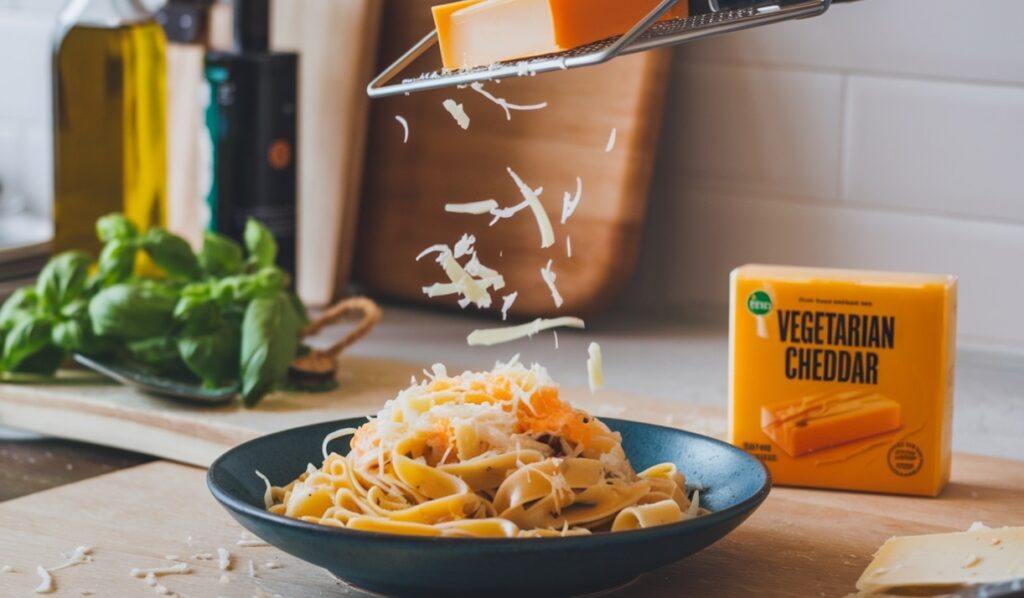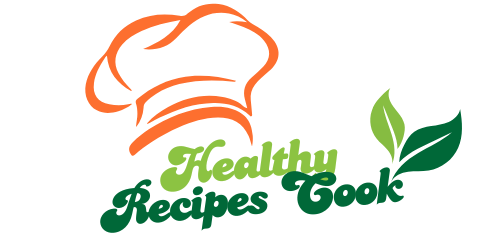Cheese is one of life’s simple pleasures, isn’t it? Whether you’re sprinkling it on your pasta, melting it into gooey perfection, or enjoying it on a charcuterie board, cheese is the ultimate comfort food. But what if you’re vegetarian? Enter vegetarian cheese a tasty solution that bridges ethics, health, and deliciousness.
In this guide, we’ll unravel everything about vegetarian cheese, from what it is, to why you should try it, and even how to make it at home. So, grab a snack (preferably cheese!), and let’s dive in!
Table of Contents
What Is Vegetarian Cheese?
The Origins of Cheese: A Non-Vegetarian Start
Cheese-making has a rich history dating back thousands of years, and interestingly, it all started with animal rennet. Specifically, rennet, an enzyme derived from the stomach lining of calves, has traditionally been used to coagulate milk into cheese. However, this method is not exactly vegetarian-friendly, right?
Learn more about the healthiest dairy options that align with your values.
For a closer look at whether Provolone falls into the vegetarian category, read our in-depth article Is Provolone Cheese Vegetarian?.
How Vegetarian Cheese Differs From Traditional Cheese
Vegetarian-friendly cheeses replace animal rennet with plant-based alternatives such as microbial enzymes, thistle, or fig sap. Discover how dairy choices impact health for an ethical and nutritious lifestyle.
For those who enjoy bold flavors, blue cheese crumbles can be a fantastic addition to salads and dressings.
Why Choose Vegetarian Cheese?
Health Benefits of Vegetarian Cheese
Who doesn’t love indulging guilt-free? Many vegetarian cheeses are lower in saturated fat and cholesterol, making them a heart-healthy option. Plus, some are fortified with nutrients like calcium and vitamin B12. They are a great option for a balanced diet, similar to the principles outlined in healthy dinner habits.
Ethical Reasons for Choosing Vegetarian Cheese
For many people, the choice isn’t solely about what’s on their plate it’s also about the origins of their food. Opting for cheese made with vegetarian-friendly methods reflects ethical values, as it ensures that no animals are harmed during production, much like opting for eco-friendly oatmeal dishes.
Environmental Impact
Did you know that traditional dairy farming is a major contributor to greenhouse gas emissions? By contrast, cheese alternatives, particularly dairy-free ones, have a significantly smaller carbon footprint, making them an eco-friendly choice and a win for the planet.
Block Quote
“Switching to vegetarian cheese isn’t just a dietary choice; it’s a step towards a more sustainable and compassionate lifestyle.”
“If you’re looking for a more detailed breakdown of how to choose a vegetarian-friendly Gouda, check out our complete guide: **Vegetarian Gouda Cheese.”
Common Ingredients in Vegetarian Cheese
Plant-Based Rennet: A Game Changer
Plant-based rennet is a vegetarian’s best friend. Derived from microbial enzymes or plants, it performs just as well as its animal-based counterpart, offering that perfect cheese texture.For example, plant-based recipes often draw inspiration from nutritious plant-based meals.
Dairy-Free vs. Vegetarian Cheese: What’s the Difference?
Not all vegetarian cheeses are dairy-free. If you’re exploring dairy-free options, consider cheesy yet lactose-free recipes for added variety.
Popular Brands That Offer Vegetarian Cheese
Artisan Vegetarian Cheese Makers

Artisan cheese carries a unique charm, and vegetarian options are happily keeping pace. Brands like Miyoko’s Creamery and Kite Hill are leading the way, creating gourmet plant-based and vegetarian-friendly cheeses that rival traditional varieties in indulgence and quality. Additionally, these small-batch producers focus on using premium ingredients, offering distinctive flavors like truffle, smoked paprika, or aged cheddar that cater to refined palates
Supermarket-Friendly Options
Don’t worry; you don’t need to shop at specialty stores to find vegetarian cheese. Brands like Cabot and Tillamook offer options made with microbial rennet. Plus, many supermarkets now stock popular vegan cheese alternatives like Daiya or Violife, which cater to both vegetarians and vegans.
Popular Brands That Offer Vegetarian Cheese
Artisan Vegetarian Cheese Makers
For cheese connoisseurs, artisan vegetarian cheese makers are a dream come true. These small-scale producers focus on crafting high-quality, flavorful cheeses that cater to ethical eaters. Some top artisan brands include:
- Miyoko’s Creamery: Renowned for its plant-based aged cheeses and creamy spreads, Miyoko’s has established itself as a trailblazer in the world of vegan and vegetarian artisan cheese. Their innovative products frequently incorporate high-quality ingredients such as cashews and coconut oil, delivering exceptional flavor and texture.
- Kite Hill: This brand specializes in almond milk-based cheeses, offering everything from ricotta to cream cheese. Their products are versatile, making them suitable for baking, spreading, or topping.
- Treeline: Treeline’s cashew-based cheeses are fermented for authentic, tangy flavors. They focus on soft cheeses, such as herb-garlic or scallion-flavored varieties.
Artisan cheeses often boast unique flavors like black truffle, smoked paprika, or even cranberry-studded varieties, making them perfect for pairing with wine or crackers.
Supermarket-Friendly Options
If convenience is what you’re after, there are plenty of vegetarian cheese options easily found at most supermarkets:
- Cabot: A beloved brand among vegetarians, Cabot offers a wide range of cheeses made with microbial rennet. Their sharp cheddar varieties are particularly popular.
- Tillamook: Known for their creamy texture and rich flavors, Tillamook cheeses are made with vegetarian-friendly microbial rennet.
- Violife: A vegan-friendly brand, Violife specializes in dairy-free cheeses that melt and stretch like traditional ones. They offer options like mozzarella, cheddar, and even feta.
Whether you’re shopping locally or online, these brands provide accessible options for vegetarians seeking ethical and tasty cheeses.
How to Identify Vegetarian Cheese in Stores
Understanding Cheese Labels
Understanding what’s in vegetarian cheese can be one of the most challenging aspects of shopping for it. While labels can sometimes be unclear, knowing a few key terms can make identifying vegetarian-friendly options much easier:
- Vegetarian Rennet: Indicates that the cheese uses plant-based or microbial enzymes instead of animal-derived rennet.
- Microbial Enzymes: These are lab-grown enzymes that mimic the function of animal rennet, making them completely vegetarian.
- Rennet-Free: Some cheeses, particularly fresh varieties like ricotta or paneer, don’t require rennet at all.
If the packaging doesn’t specify, check the manufacturer’s website or ask store staff for clarification.
Look for terms like “vegetarian rennet” or certifications such as “Vegetarian Society Approved.” Similarly, understanding food labeling is crucial when selecting healthy snacks like oatmeal or vegetarian cheese.
Vegetarian Certifications to Look For
Certifications are a foolproof way to ensure the cheese meets vegetarian standards. Look for these logos:
- Vegetarian Society Approved: This globally recognized certification guarantees that no animal products (like rennet) are used in the cheese-making process.
- V-Label: Widely used in Europe and beyond, this certification ensures the product is vegetarian or vegan.
These labels not only save time but also provide peace of mind when shopping.
Homemade Vegetarian Cheese Recipes
Easy Beginner Recipes
Start with simple recipes like tofu ricotta. Or, for an innovative twist, incorporate inspiration from plant-based casseroles.

Tofu Ricotta Recipe
- Ingredients:
- 1 block of firm tofu
- 2 tbsp olive oil
- 1 tbsp lemon juice
- 3 tbsp nutritional yeast
- 1 tsp garlic powder
- Salt and pepper to taste
- Instructions:
- Crumble the tofu into a bowl.
- Add olive oil, lemon juice, nutritional yeast, garlic powder, salt, and pepper.
- Mix until the texture resembles ricotta. Adjust seasoning as needed.
This simple ricotta is perfect for lasagnas, stuffed shells, or even as a dip!
Advanced Cheese-Making Techniques
For those ready to level up, hard cheeses like cheddar or gouda can be made at home with a bit more effort. You’ll need:
- Plant-based rennet
- Cheese molds
- Cheesecloth
- A controlled aging environment (your fridge works fine!)
Basic Vegetarian Cheddar Recipe
- Ingredients:
- 4 liters of whole milk
- 1 tsp vegetarian rennet (diluted in water)
- 1/4 cup starter culture (yogurt or buttermilk)
- Salt to taste
- Instructions:
- Heat the milk to 86°F (30°C) and add the starter culture. Let it sit for an hour.
- Add the diluted rennet and stir gently. Allow it to coagulate for 30–40 minutes.
- Cut the curd into small cubes and heat to 102°F (39°C) while stirring.
- Drain the whey, press the curd into a mold, and let it age for at least a month.
With practice, you can master more complex recipes and customize the flavors to your liking!
FAQs About Vegetarian Cheese
Is Gouda Cheese Vegetarian?
Not always. Traditional gouda often contains animal rennet. However, many brands now produce vegetarian versions using microbial or plant-based rennet. Always check the label to ensure it’s suitable for vegetarians.
Is Provolone Vegetarian?
Like gouda, provolone traditionally uses animal rennet. However, vegetarian-friendly versions are available from brands that use microbial enzymes. Be sure to read the packaging or verify with the manufacturer.
Which Cheese Has No Rennet?
Fresh cheeses like ricotta, paneer, and cream cheese typically don’t require rennet, making them naturally vegetarian. However, always confirm the ingredients list to be certain.
What Cheese Can Vegetarians Eat?
Vegetarians can enjoy cheeses made with microbial or plant-based rennet. Popular options include:
- Cheddar (vegetarian brands)
- Mozzarella (with vegetarian rennet)
- Cream cheese
- Ricotta
- Paneer
Is Cheddar Cheese Considered Vegetarian?
It depends on the brand. Traditional cheddar often contains animal rennet, but many modern producers offer vegetarian alternatives using microbial enzymes. Brands like Cabot and Tillamook are good examples.
Block Quote
“Cheese labels can be tricky, but once you crack the code, the world of vegetarian cheese is deliciously rewarding!”
Common Problems and Solutions When Choosing Vegetarian Cheese
Limited Availability: Where to Find It
One of the biggest hurdles for vegetarians is finding suitable cheese options in certain regions. While larger cities often have well-stocked grocery stores, rural areas may have fewer choices. For rural areas, vegetarian cheese can be hard to find. Online platforms like Healthy Recipes Cook offer a plethora of ideas for ethical eating. But don’t worry there are solutions!
Solutions:
- Online Shopping: Platforms such as Amazon, Instacart, and specialized vegan or vegetarian retailers make it easy to have vegetarian cheese delivered right to your doorstep.
- Farmer’s Markets: Local cheese artisans at farmer’s markets often use vegetarian rennet and are typically more than happy to share details about their production methods, allowing you to make informed choices.
- DIY Cheese Making: When all else fails, making your own cheese is a satisfying and creative alternative.
Taste Differences: Adapting Your Palate
For those new to vegetarian cheese, the flavor might not fully replicate traditional varieties right away. This is particularly true for plant-based cheeses, which often have a nuttier taste or a distinctive tang that sets them apart.
Solutions:
- Start Slow: Choose mild cheeses like mozzarella or cream cheese, which have less pronounced flavors.
- Experiment with Brands: Not all vegetarian cheeses are created equal. Test different brands until you find one that suits your taste buds.
- Pair Wisely: Combine cheeses with complementary foods. For example, a tangy vegetarian cheddar pairs beautifully with apple slices or fig jam.
The Future of Vegetarian Cheese
H3: Innovations in Cheese-Making Technology
The market for cheese alternatives is booming, with innovation driving its rapid growth. Scientists and food technologists are continually discovering new methods to enhance flavor, texture, and sustainability.
- Precision Fermentation: This cutting-edge method involves using microbes to produce casein the key protein in milk without using cows. The result? A plant-based cheese that tastes and behaves just like traditional dairy cheese.
- Aging Techniques: Some companies are experimenting with traditional cheese-aging methods for plant-based products to replicate the depth and complexity of aged cheeses.
- Natural Additives: Ingredients like tapioca starch, agar-agar, and natural flavorings are being refined to improve the melting and stretching properties of vegetarian and vegan cheeses.
Market Trends: Is Vegetarian Cheese Here to Stay?
The growing demand for vegetarian and vegan products is undeniable. In recent years, the plant-based cheese market has grown exponentially, driven by:
- Consumer Awareness: People are increasingly mindful of the ethical, environmental, and health implications of their food choices.
- Improved Products: As vegetarian and vegan cheeses improve in quality, they’re attracting not only vegetarians but also flexitarians and omnivores.
- Diverse Options: Offering a diverse range of styles, flavors, and price points, vegetarian cheese has something to offer for nearly every palate and budget.
Everything indicates that vegetarian cheese is on its way to becoming a household staple worldwide, helping to foster a more sustainable and inclusive food culture for the future.
Why Vegetarian Cheese is Worth the Try
If you’ve ever been unsure about trying cheese alternatives, now is the perfect time to explore them. Whether your motivation is ethics, health, or environmental impact, there’s an option out there that suits your needs.
Not only do these cheeses let you enjoy your favorite dishes guilt-free, but they also unlock exciting new culinary possibilities. From creamy cashew-based spreads to aged plant-based options, the variety is truly impressive.
Vegetarian cheese isn’t just food; it’s a step toward sustainability. Explore more ways to integrate ethical eating into your lifestyle by browsing healthy cooking guides.
So, the next time you’re browsing the cheese aisle, why not pick a more sustainable and animal-friendly choice? It’s a small step that can have a big impact for animals, the planet, and your taste buds.

